It takes a team of dedicated individuals to work together to ensure the sustainability of our forests and biodiversity that is our commitment to the next generation and to all living things.
Together we can make a difference.
 Some of the team it’s hard to all get together as we are off in the field on various projects!
Some of the team it’s hard to all get together as we are off in the field on various projects!
Co-Directors:
Banak Gamui and Miriam Supuma each have B.Sc. with Honors from PNG and M.Sc. degrees from overseas universities. Before forming PNGIBR they each had a full year of experience as acting directors of the WCS-PNG Country Program and over a decade of biological and community work in PNG. They are responsible for administration, funding, reporting and networking for PNGIBR, in addition to all of the responsibilities of staff biologists.
Staff Biologists:
All staff biologists have B.Sc with Honors from PNG and M.Sc. degrees from overseas universities. Each is responsible for conducting their own research and outreach in addition to mentoring student interns. Each has over a decade of field work in PNG and a lifetime of PNG cultural understanding. Paul Igag focuses on birds, Muse Opiang and Enock Kale focus on mammals, Kore Tau Na’au works with bats, Katayo Sagata focuses on insects, Michael Kigl handles landowner liaisons and Kenneth Yhuanje and Junior Novera work on hunting studies.
Support Staff:
Anna Koki is our Office Manager; she handles logistics, office communication, and Petty Cash. Onika Okena is our driver, Kamena Yoriene is our security guard, andSisera Kamena is our housekeeper. All are well-trusted and excellent at what they do.
Advisory Board:
Dr. Debra Wright and Dr. Andrew Mack are biologists with over two decades experience working in PNG and mentoring PNG students. They were founders and Co-Directors of the Wildlife Conservation Society’s PNG Programme which they ran for eight years. Dr. Paige West is an anthropologist with over fifteen years of experience working in PNG and has had a strong collaboration with the team’s hunting project over the years. Dr. Eric Kwa is a law professor at the University of PNG and has pioneered several policy initiatives for the PNG government in his work with the PNG Center for Environmental Law (CELCOR).
PNGIBR Staff Profiles
Banak Gamui, Co-Director[custom_frame_right]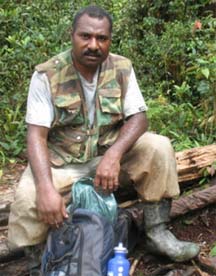 [/custom_frame_right]
[/custom_frame_right]
2007 Masters Degree in Ecology, Evolution & Systematics from University of Missouri – St. Louis, USA; 2007 Graduate Certificate in Conservation Biology from University of Missouri – St. Louis, USA; 2005 First Class Honours Degree from University of PNG; 2003 Graduate Certificate in Communication of Science and Technology from University of Technology PNG; 1996 B.Sc. in Biology from University of PNG.
Banak’s past research interests include the annual cycling of a montane rainforest at the Mekil Research Station, Sandaun Province, PNG. He trained a team of local landowners to collect field data on bird activity, litter fall, plant phenology and climatological variables. With these data, he discovered what cues guide the reproductive cycles of birds to develop plans to conserve functional forest systems. Banak’s data on growth and productivity of a montane forest is the only available from PNG for assessing montane forests as carbon sinks, a topic of growing importance as the world grapples for ways to buffer global climate change.
Banak was awarded a first class Honours degree for this work, and received a scholarship for study in the USA. Upon returning to PNG with his Masters Degree, Banak assumed a leadership role with the previous WCSPNG program as Co-Director and then became a co-founder of the Papua New Guinea Institute of Biological Research (PNGIBR). Banak’s research interests include evolutionary ecology of plant-animal interactions and forest productivity; his current research project is on herbivory and defense mechanisms of an introduced exotic plant species, Piper aduncum.
Miriam Supuma, Co-Director[custom_frame_right]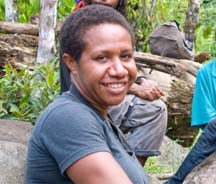 [/custom_frame_right]
[/custom_frame_right]
2005 Masters Degree in Tropical Rainforest Ecology from James Cook University, Australia; 2003 First Class Honours Degree from University of PNG; 2002 B.Sc. in Biology from University of PNG.
Miriam’s honours research was on PNG forest dynamics including mortality, recruitment, and growth rates of trees within 4.2 ha of plots at Crater Mountain Wildlife Management Area. In addition to rainforest demography, Miriam studies wildlife ecology and conservation and is currently researching traditional use and valuation of wildlife, especially as it relates to bird species used for adornment and trade by highlands people. She wants to understand the implications of these practices on wild populations and search for ways to make cultural practices sustainable. Upon returning to PNG with her Masters Degree, Miriam assumed a leadership role with the previous WCSPNG program as Co-Director and then became a co-founder of the Papua New Guinea Institute of Biological Research (PNGIBR).
Paul Igag, Staff Biologist[custom_frame_right]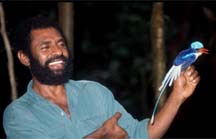 [/custom_frame_right]
[/custom_frame_right]
2005 Post Graduate Diploma in Wildlife Management from University of Otago, New Zealand; 2003 Masters Degree in Zoology from Australian National University; 1996 B.Sc. in Biology from University of PNG.
Since 1998 Paul has studied the nesting and feeding ecology of Palm Cockatoos, Eclectus Parrots and Vulturine Parrots in the Crater Mountain Wildlife Management Area. These species play important roles in the overall ecology of rainforests through seed dispersal, but are vulnerable to destructive logging practices and wildlife hunting for feathers as well as meat. Paul has learned much about the nesting and dietary requirements of these rare birds. Due to Paul’s extensive field experience and mist-netting abilities, he works with several organizations conducting biodiversity surveys, is our field supervisor for the nest box project, and has been an instructor on our annual biological field techniques course. He is a co-founder of PNGIBR.
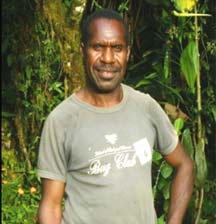 Katayo Sagata, Staff Biologist
Katayo Sagata, Staff Biologist
2007 Masters Degree from Victoria University of Wellington, New Zealand; 2003 First Class Honours Degree from University of PNG; 1999 B.Sc. in Biology from University of PNG.
Katayo proposed, conducted and completed his Honours Degree project on twig-nesting ant colonization. These obscure ants play a crucial role in rainforest ecosystems. Katayo is especially interested in invasive ants and plans to study some of these well established species like Yellow Crazy Ants (Anoplolepis gracilipes) and Big-headed Ants (Pheidole Megacephala), as well as the recently established Little Fire Ant (Wasmannia auropunctata), to assess their effect on biodiversity, cash crops and general human health in PNG. Apart from ants, Katayo has also worked on Echidna foraging ecology and water beetle diversity in PNG. His water beetle project is a long term collaboration with Dr. Michael Balke of the Zoological State Collection in Munich, Germany. Katayos work has resulted in several publications in peer-reviewed journals. Katayo is a co-founder of PNGIBR and will be beginning his PhD at LaTrobe University in Melbourne in June 2010.
Muse Opiang, Staff Biologist[custom_frame_right]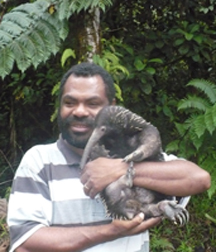 [/custom_frame_right]
[/custom_frame_right]
2008 Masters Degree in Ecology, Evolution & Systematics and Graduate Certificate in Tropical Ecology and Conservation from University of Missouri St. Louis, USA; 2005 First Class Honours Degree from University of PNG; 1999 B.Sc. in Biology from University of PNG.
While employed by a local NGO, the Research and Conservation Foundation of PNG, Muse identified the need for research into echidnas. Drs. Andrew Mack and Debra Wright (then Co-Directors of WCS-PNG) challenged him to demonstrate that he could capture Long-Beaked Echidnas, and if so, they would help him to study these animals. He was successful and thus began the first ever study of this critically endangered monotreme. The Long-beaked Echidna is one of New Guinea’s rarest and most threatened terrestrial vertebrates, yet it had never been studied; Muse radio-tracked over a dozen individuals in a five year period and recorded the first ever observation of lactation in the wild. This species is heavily hunted and is extremely vulnerable; Muse is using his findings to craft a management plan that locals will find acceptable to protect this species from extinction.
Muse’s work gained him the cover of the Journal of Mammalogy and he has been interviewed for the New York Times and several Australian radio and TV programs. Muse is a co-founder of PNGIBR and will begin his PhD studies at the University of Tasmania with an Endeavour Scholarship in March 2010. He will be continuing his echidna work for this degree with a research grant from the Australia and Pacific Science Foundation.
[custom_frame_right]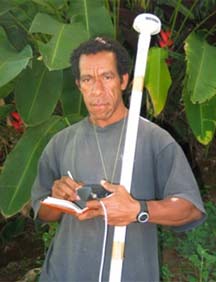 [/custom_frame_right]Michael Kigl, Staff Biologist
[/custom_frame_right]Michael Kigl, Staff Biologist
2007 Masters Degree in Environmental Management from the Australian National University; 2003 Honours Degree from University of PNG; 1998 B.Sc. in Social Sciences from UPNG.
Michael was previously employed by a mining company as an environmentalist but left the job to join our hunting project at the Crater Mountain Wildlife Management Area and the Mekil Conservation Initiative in 2003. Michael was responsible for interviewing local people about their hunting practices and collecting specimens of hunted wildlife for species and age verification. The studys aim was to understand the hunter-animal relationship to formulate sound management protocols to ensure the sustainable use and continuity of hunted wildlife while at the same time maintaining the dietary needs of local communities. With his anthropology and social sciences background, along with his extensive community work, he is well suited to be our Cultural Officer, handling community liaison and networking. Michael is a co-founder of PNGIBR.
[custom_frame_right]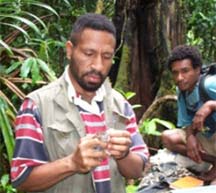 [/custom_frame_right]Enock Kale, Staff Biologist
[/custom_frame_right]Enock Kale, Staff Biologist
2009 Masters Degree in Ecology, Evolution & Systematics from the University of Missouri – St. Louis, USA; 2009 Graduate Certificate in Conservation Biology, University of Missouri – St. Louis, USA; 2008 First Class Honours Degree University of PNG; 2003 B.Sc. in Forestry from PNG University of Technology.
Enock spent three consecutive years in the field and collected the first ever year-round reproductive data on small mammals in New Guinea by trapping a 6.4 ha grid. He believes the reproductive seasonality and population biology data gathered are key areas of knowledge needed for effective conservation and wildlife management in Papua New Guinea. Enock also attended a Mark-Recapture Software workshop in the USA to learn valuable modeling techniques and has taught on our annual field training courses. Enock is a co-founder of PNGIBR.
Kenneth Yhuanje, Staff Biologist[custom_frame_right]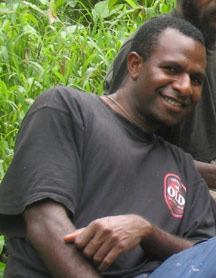 [/custom_frame_right]
[/custom_frame_right]
2010 Masters Degree in Ecology, Evolution & Systematics and Graduate Certificate in Tropical Ecology and Conservation from University of Missouri – St. Louis, USA; 2008 First Class Honours Degree from University of PNG; 2004 B.Sc. in Biology from University of PNG.
Kenneth’s Honours project was to assess the sustainability of two commonly hunted mammals, the Echymipera bandicoot and the Ground Cuscus, using the Robinson & Redford Model to establish maximum sustainable hunting limit. From this work important recommendations will be established that can be used to regulate current hunting practices. Two emerging recommendations are for selective hunting of reproductively fecund species like bandicoots over less fecund species like Ground Cuscus and for establishing population refugia for safe breeding grounds for game animals. Kenneth rejoined PNGIBR with his Masters in 2010 and is a co-founder of PNGIBR.
Junior Novera, Staff Biologist[custom_frame_right]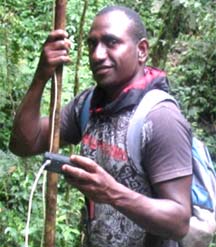 [/custom_frame_right]
[/custom_frame_right]
2010 Masters Degree from Lancaster University, UK; 2009 First Class Honours Degree from University of PNG; 2005 B.Sc. in Biology from University of PNG.
Junior is part of our hunting project in the Crater Mountain Wildlife Management Area and the Mekil Conservation Initiative. Junior’s Honours project within the larger hunting study was to investigate the seasonality and subsistence hunting practices of the Sokamin people to learn who hunts what, when and where. The long term goal of this study is to design protocols that local people will agree to for the sustainable use of wildlife to reduce the negative effects of hunting. This is a collaborative and comprehensive study of a subject that impacts both the survival of many wildlife species in PNG and the survival and health of the majority of the PNG population that still depend on wildlife as their only dietary protein source. Junior rejoined PNGIBR with his Masters in 2010 and is a co-founder of PNGIBR.
Kore Tau Na’au, Staff Biologist[custom_frame_right]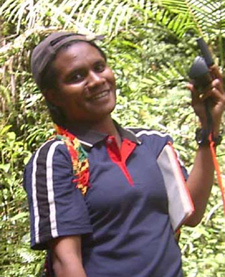 [/custom_frame_right]
[/custom_frame_right]
2010 Honours degree from University of PNG waiting for final grade. 2004 B.Sc. in Biology from UPNG. Kore graduated from being an IBR student to a staff member in July 2010.
Kore’s Honours topic was “Abundance, reproduction and roost site selection of the greater bare-backed bat Dobsonia moluccensis and the critically endangered Bulmer’s fruit bat Aproteles bulmerae in Papua New Guinea.” Flying foxes are relatively large vertebrates living in conspicuous communal roosts and are particularly attractive as an easy source of protein to subsistence hunters. In some parts of PNG cave entrances are blocked by hunters and emerging bats are killed; this is a severe problem with entire populations being killed in a few days. Kore completed her Honors field work in mid 2006 spending a total of seven months in the rugged mountains of the Crater Mountain Wildlife Management Area (CMWMA). She counted bats in a total of 10 caves and sinkholes, mist-netted them for identification and reproductive information, and measured cave parameters to see if any of the parameters affect bat selection for roosting caves. Kore’s field data provides high-quality information on population estimates and reproductive frequency of montane flying foxes in PNG. She has collected valuable information on site parameters that will help conservationists identify which caves are most suitable for roosting bats of several species. She has also positively confirmed the occurrence of an extremely rare species of flying fox, Bulmer’s Fruit Bat (Aproteles bulmerae), until recently considered extinct, in a sinkhole in the CMWMA. Kore was awarded a scholarship for a Masters degree in the US in 2007, but instead decided to marryher long-time fiancée and start a family. Kore has now decided she is ready to go back to her studies and pursue a graduate degree and is applying for scholarships. Kore successfully completed her Honours degree requirements in Feb 2010 and is awaiting her final grade.
Anna Koki, Office Manager[custom_frame_right]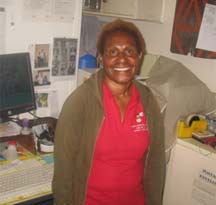 [/custom_frame_right]
[/custom_frame_right]
Anna has been our Office Manager since 2003 when we were still with the Wildlife Conservation Society. She is responsible for organizing all logistics for students, staff members and visiting researchers. She handles payroll and banking, petty cash, and communications in the office and with remote locations. She has provenherself over and over again and has a network among the business community that ensures things are done quickly and efficiently. Anna is a co-founder of PNGIBR.
Onika Okena, Driver[custom_frame_right]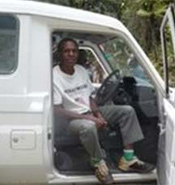 [/custom_frame_right]
[/custom_frame_right]
Onika has been our trusty driver since 2002 and has 30 years of professional experience driving. He is responsible for maintaining our vehicles in good condition in addition to making sure we get where we are going safely. Onika is from Goroka, Eastern Highlands Province.
Kamena Yoriene, Security Guard[custom_frame_right]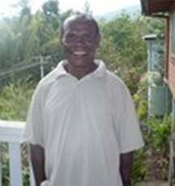 [/custom_frame_right]
[/custom_frame_right]
Kamena is our security guard and gardener. He is from Marawaka, in the Eastern Highlands Province, where men have a reputation as respected warriors. Kamena is very effective at his job and has been with us for several years. He is very helpful and always keeps busy.
Sisera Kamena, Housekeeper[custom_frame_right]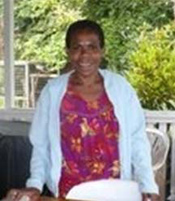 [/custom_frame_right]
[/custom_frame_right]
Sisera is our housekeeper and is responsible for making sure the office and shared accommodation houses are always clean.
Debra Wright, Advisory Board[custom_frame_right]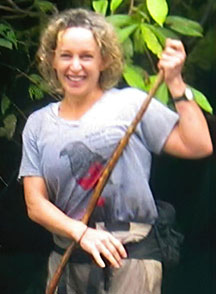 [/custom_frame_right]
[/custom_frame_right]
1998 Ph.D. in Tropical Biology from the University of Miami; 1989 M.Sc. in Zoology from the University of Florida; 2008 Master of Accounting courses from Chatham University; 1986 B.Sc. in Zoology from the University of Florida.
Debra began her career trapping and radio-tracking opossums for four years in Florida and for a month in Venezuela. She met Andrew Mack on a 2-month tropical biology field course in Costa Rica which became a capacity building model for their life’s work in Papua New Guinea, where she spent most of her time from 1987-2012.
With Andy she co-founded and built the Crater Mountain Biological Research Station in 1989 to make it easier for other scientists to explore the little known flora and fauna of PNG; over 150 scientific papers have been published from research conducted there. She lived at the station from 1989-1993 conducting her dissertation work on cassowaries, in addition to establishing long-term plant plots, trapping mammals, and mist-netting birds and bats. She has mentored PNG Honors students since 1994 and has run month-long remote field biology courses for PNG students from 1996-2012. She raised funding for, organized, and led five altitudinal bio-diversity surveys for mammals, birds, herps, and plants from 1996-1998, with full training for both a landowner and a PNG student/professional in each taxa. She took dozens of these landowners out to the National Herbarium in Lae and the National Museum in Port Moresby so they could see where the vouchers would be housed and know that generations to come would be able to see and experience them. With Andy she co-founded and ran the Wildlife Conservation Society’s PNG program from 1999 through 2007, with a major emphasis on capacity building for PNG biologists so that research and conservation could come from within the country, by its own citizens, in ways that would work culturally. They build a ‘campus’ in Goroka where they mentored dozens of PNG Honors students through 2-year research degrees and helped them obtain scholarships for Masters and PhDs in Australia, the UK, USA and New Zealand. They envisioned and built the program, raising almost all of the funds for it, including their own salaries. In 2007 WCS said they were not a university and abruptly said they were closing the program; Deb convinced them to allow two PNG nationals to take over as interim Co-Directors until remaining grant funds ran out. In 2008 she co-founded the Papua New Guinea Institute of Biological Research with those Co-Directors and other former students to continue the work as a fully PNG-led organization. She has raised over US$8 million in grant funds and has dozens of peer-reviewed scientific papers/book chapters.
Andrew Mack, Advisory Board[custom_frame_right]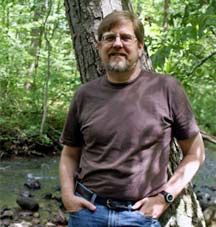 [/custom_frame_right]
[/custom_frame_right]
1995 Ph.D. in Tropical Biology from the University of Miami; 1985 B.Sc. in Biology from the University of Delaware.
Andrew Mack has been involved in rain forest research and conservation since 1974 when he made an expedition to the summit of El Triunfo in Mexico. Since then he has worked in Mexico, Costa Rica, Ecuador, Guyana, Peru, Bolivia, Malaysia and Indonesia. But most of his focus has been Papua New Guinea where he spent most of his time 1987-2007.
He currently holds one of the few endowed conservation biologist positions in the United States, the William and Ingrid Rea Conservation Biologist at the Carnegie Museum of Natural History and funded by the Heinz Endowments. He has been a Fulbright Scholar to PNG, a Visiting Fellow at Australian National University, and is a Research Associate at the University of Kansas. He has held senior positions at Conservation International and the Wildlife Conservation Society and was Collections Manager for Birds at the Academy of Natural Sciences.
He was a co-founder of the Crater Mountain Biological Research Station in PNG. His research in PNG over twenty years has examined seed dispersal by cassowaries, seedling ecology, biogeography & phylogeography, ornithology, bioacoustics, hunting & wildlife consumption, and a wide range of topics with collaborators in eight countries. He has a species of
frog and a canopy tree, both from New Guinea, named in his honor. He has over fifty scientific publications. He is most proud of the many Honours Degrees in Biology by UPNG students he helped mentor of which most have continued on to Masters Degrees at top universities and are now conservation professionals in Papua New Guinea. Andrew is a co-founder of PNGIBR.
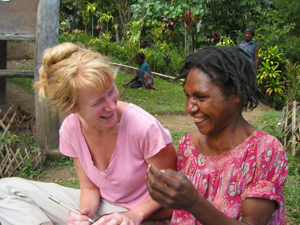 Paige West, Advisory Board
Paige West, Advisory Board
2000 Ph.D. in Cultural Anthropology from Rutgers University; 1994 M.A. in Environmental Anthropology from the University of Georgia.
From 2001 to 2009 Dr. West has been a professor at Barnard College and Columbia University where she was tenured in 2009. She is also currently the Curator for the Pacific at the American Museum of Natural History. Drawing on the theories, methods, and insights of anthropology, geography, and ecology, Dr. West has conducted fieldwork in Papua New Guinea, Australia, Germany, England, and the United States.
Her primary research site, since 1996, has been Papua New Guinea. In 2002 she received the American Anthropological Association’s Anthropology and Environment Junior Scholar award for her work, in 2004 she received the American Association of University Women Junior Faculty Fellowship and the American Council of Learned Societies Faculty Fellowship, in 2006 she received the Rockefeller Foundation’s Bellagio Fellowship, and in 2007 she was named a Fellow by the Association of Social Anthropology in Oceania. In 2008 she founded the journal Environment and Society: Advances in Research, and she is currently the president of the Anthropology and Environment Section of the American Anthropological Association.
Dr. West’s research interests include the linkages between environmental conservation and international development, the aesthetics, poetics, and materiality of human social relations with nature, and the critical analysis of the creation of commodities and practices of consumption. Dr. West is the editor of four books and the author of two books and numerous articles and papers. Her current research, funded by The Christensen Fund and Columbia University, is a study of the meanings and values attributed to plants and animals in Papua New Guinea with a focus on how these objects articulate with economic needs and social change. Paige is a co-founder of PNGIBR.
Eric Kwa, Advisory Board
Dr. Eric Kwa is a law professor at the University of PNG and has pioneered several policy initiatives for the PNG government in his work with the PNG Center for Environmental Law (CELCOR) including Provincial Forestry Bills for Madang and Eastern Highlands Provinces. He is PNG’s most prominent environmental lawyer.